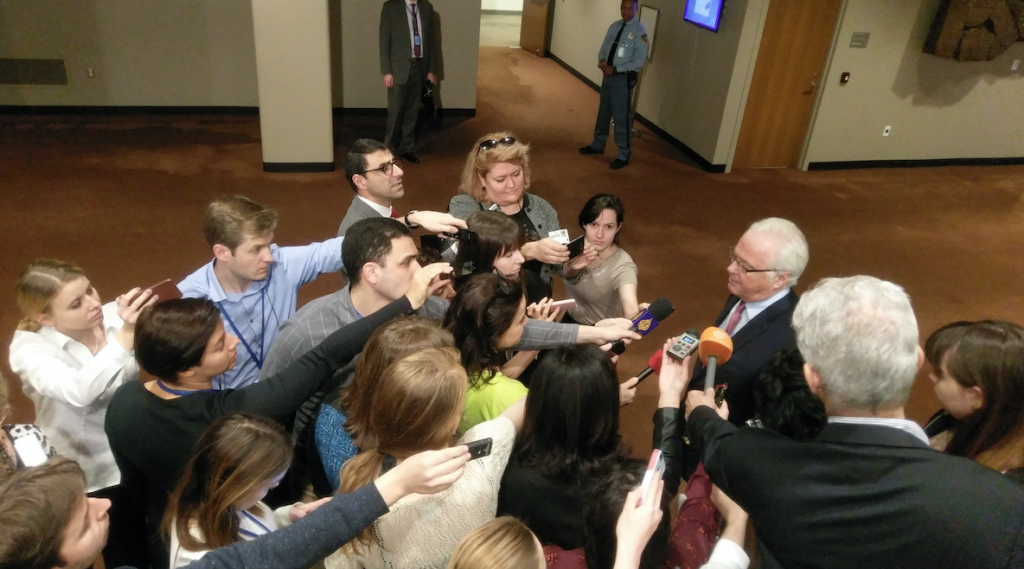Remarks to the press by Ambassador Vitaly Churkin, Permanent Representative of the Russian Federation to the United Nations, before the Security Council consultations on Syria
Q: Tomorrow’s vote in the UNGA will be on Syrian resolution...
V.Churkin: Not very effectively. First of all, the Security Council is still engaged on this matter. But we understand people in the General Assembly, they want to speak, so we are going to have a discussion and we are going to participate in that discussion. To expect that it is going to produce some kind of dramatic U-turn in the situation in Syria is unrealistic.
Q: We were told that Russia did not take part in negotiations on this draft resolution. Can you tell us why?
V.Churkin: We felt that there were things that needed to be included, the draft resolution we feel is not strong enough on fighting terrorists in Syria. Some things which are included in Security Council resolutions, for example, the need to distance the so-called moderate opposition from the terrorists, the need not to apply the CoH regime to terrorists – those things are not there, but we are realistic about correlation of forces in the UNGA so we decided that it was not worthwhile for us to engage in the General Assembly particularly in a situation when we believe that our focus needs to continue to be in the Security Council.
Q: Have you met with Mr. de Mistura since he got to New York? Can you share with us what did you tell him?
V.Churkin: Yes, I have. We had a discussion and let’s see what he has to tell us. I think he is in a rather difficult position because time is short. I think that it would be important to try to revive the talks before SG Ban’s term expires, it is just 20 days.
Q: Ambassador, do you think talks can begin after Aleppo is fully liberated?
V.Churkin: I think that talks must begin at some point. And we have been urging Mr. de Mistura to do it as quickly as possible for a number of reasons. I am sure he is going to explain that to us again today why he did not do that. We were critical of his strategy. It was not a proper strategy to wait for some perfect moment or better moment to resume negotiations and to expect that the parties will give some “sign in the sky” about their willingness to be better negotiators. In order to force them to negotiate in good faith you need to have them at the table. When they are not at the table it is very hard to talk with them abstractly about the need to modify their position, to move it closer to the requirements of the Security Council resolution, etc. But we understand that Staffan de Mistura has been under enormous pressure and, unfortunately, this pressure did not help him to produce better results in the course of the talks, but let’s see what he has to tell us.
Q: Will you engage on the British and French draft?
V.Churkin: We haven’t seen it.
Q: Does Russia still support UNSC resolution 2254 and Geneva Communique as the basis for resuming talks?
V.Churkin: Yes, we do. The Geneva Communique has been updated into December 18 Resolution 2254 and the documents of the ISSG. For fresh reference I would be looking to those documents.
Q: On Aleppo. You have been saying that you discussed the resolution with the US and Americans are…
V.Churkin: As you know Russian MFA Minister Sergey Lavrov announced today in Hamburg the result of his two meetings with Secretary John Kerry. They did agree to have an expert meeting in Geneva on December 10. We are watching the American side with some trepidation and concern because they have shown some inconsistency. As you know, there was a meeting on December 2 and a certain proposal made by Mr. Kerry to Mr. Lavrov, they agreed to have an expert meeting, then the Americans pulled back, withdrew that proposal and that paper. I hope that this meeting they agreed on will take place the day after tomorrow.
